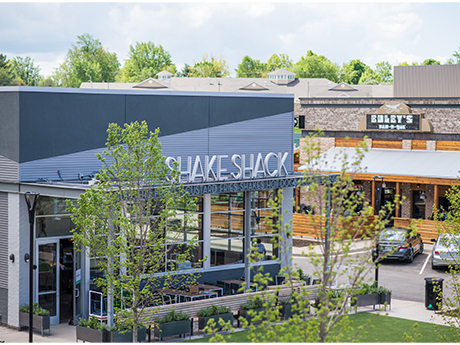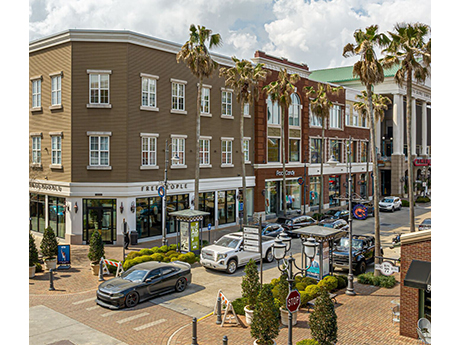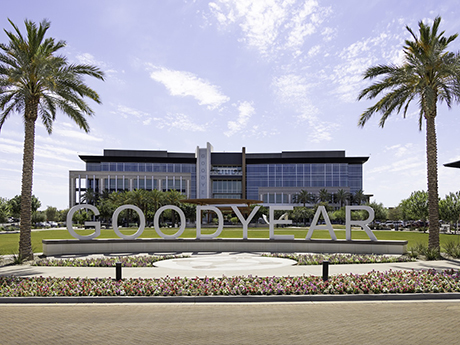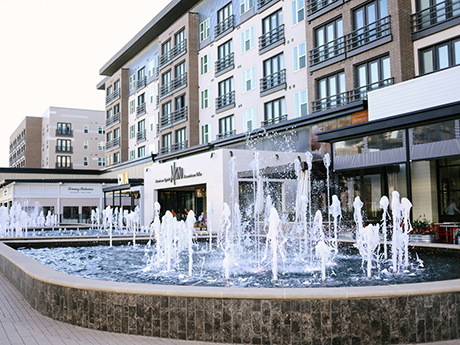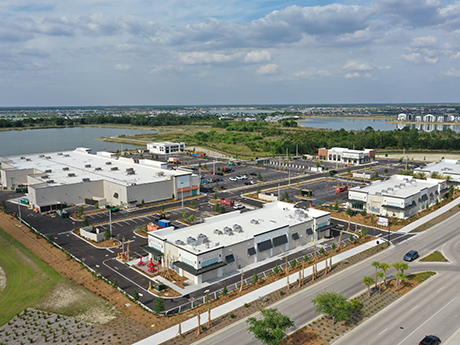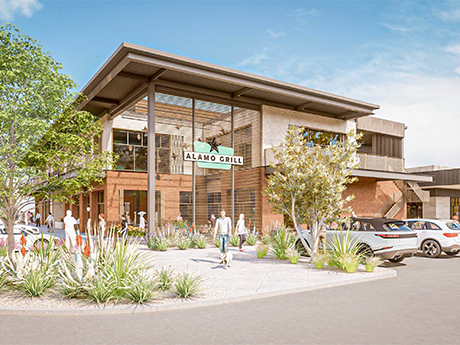BEL AIR, MD. — SJC Ventures has unveiled plans for a $100 million transformation of the Harford Mall site located in Bel Air, roughly 23 miles north of Baltimore. The redevelopment is a partnership between the Atlanta-based mixed-use development firm and the mall owner, Chattanooga, Tenn.-based CBL Properties. Upon approval by the Bel Air Economic and Community Development Commission, the redevelopment project will feature 48,000 square feet of open-air retail, restaurants and amenities that will replace a former Macy’s store, as well as a 35,000-square-foot grocery store. If approved, the new development will complement SJC’s project on the mall’s former Sears parcel, as well as the multifamily development adjacent to the former Sears. SJC Ventures also plans to incorporate pedestrian walkways for enhanced connectivity, pocket parks and open gathering spaces at the Harford Mall site.
Restaurant
ORLANDO, FLA. — Tavistock Development Co. has signed five new tenants to join Lake Nona West, a 405,000-square-foot lifestyle shopping center located within Orlando’s master-planned community of Lake Nona. The tenants include Cañonita Mexican Restaurant, Nordstrom Rack, Barnes & Noble, discount retailer HomeSense and Total Wine & More. The new round of lease signings bring the total preleased space at the property to more than 300,000 square feet, which includes a 150,000-square-foot Target anchor store. Situated on 54 acres, Lake Nona West will include wide, shaded walkways, art-lined plazas and community greenspaces. In collaboration with Mercedes-Benz High-Power charging, the center will also offer 20 Level 3 electric vehicle chargers. Tavistock, master developer of Lake Nona, expects to open Lake Nona West in spring 2026.
Hendricks Commercial Properties Acquires Summit at Fritz Farm Mixed-Use Development in Lexington, Kentucky
by John Nelson
LEXINGTON, KY. — Hendricks Commercial Properties, a Wisconsin-based development and investment firm, has acquired The Summit at Fritz Farm, a mixed-use development in Lexington that opened in 2017. The development features a collection of more than 60 shops and restaurants that sit below modern offices and The Henry apartments. Some components of the development that were not included in the sale include the Origin Lexington hotel and a 192-unit seniors housing community, Legacy Reserve at Fritz Farm. Hendricks did not disclose the sales price or specific aspects of the acquisition beyond the commercial space. Hendricks acquired the development from a partnership between Swift Creek Real Estate Partners and Centennial Real Estate Management LLC, which has owned The Summit at Fritz Farm since acquiring the original developer, Birmingham, Ala.-based Bayer Properties, in 2022. “We are excited to add Fritz Farm to our portfolio,” says Rob Gerbitz, CEO of Hendricks Commercial Properties. “This acquisition aligns with our strategic vision of investing in high-quality, experiential mixed-use properties that serve as community hubs. We look forward to building upon the strong foundation established at Fritz Farm and continuing to enhance the experience for tenants and guests alike.” Whole Foods Market, Pottery Barn and Arhaus anchor …
Trademark, TriGate Capital Recapitalize Perkins Rowe Mixed-Use Village in Baton Rouge
by John Nelson
BATON ROUGE, LA. — Trademark Property Co. has recapitalized Perkins Rowe, a 518,830-square-foot mixed-use town center in Baton Rouge, with Dallas-based real estate investment manager TriGate Capital LLC. Terms of the recapitalization structure were not released. The property comprises 384,171 square feet of retail space and 134,659 square feet of Class A office space. Trademark and TriGate plan to refresh and revitalize Perkins Rowe with improvements to the public spaces, updated signage, modernized office common areas, fresh paint, landscaping and other placemaking enhancements. Trademark, which has operated Perkins Rowe since 2016, has recently attracted tenants such as Free People, Drago’s, Tacos del Cartel and Tecovas to the development, as well as extended leases with anchor tenants including The Fresh Market and Cinemark Theatres.
Red Development, Globe Corp. Welcome Three New Retail Tenants to Goodyear Civic Square in Arizona
by Amy Works
GOODYEAR, ARIZ. — A partnership between Red Development and Globe Corp. has signed three new retail tenants to Goodyear Civic Square (GSQ), its 150-acre mixed-use development located in the Phoenix suburb of Goodyear. Trader Joe’s will open a 13,500-square-foot store — the first in Goodyear — while Black Rock Coffee Bar will open a 1,460-square-foot drive-thru coffee shop. Additionally, Firebirds Wood Fired Grill will open a 5,658-square-foot standalone building that also houses a 700-square-foot outdoor patio. All new tenants are scheduled to open in 2026. The first phase of GSQ features a newly constructed city hall and library, 2-acre park, two parking garages, as well as office space. An outpatient medical building is currently under construction and a 132-room hotel is also planned for the development. Other tenants already open at the property include Bacchus Wine & Debauchery, BJ’s Restaurant & Brewhouse, Cheddar’s Scratch Kitchen, Copper & Sage, F45 Training, Harkins Theatres and Miyu Nails and Spa.
ALLEN, TEXAS — Chicken N Pickle, a Kansas City-based concept that combines dining with pickleball and other outdoor games, has opened a 42,000-square-foot restaurant and entertainment venue in the northeastern Dallas suburb of Allen. The venue is located at The Farm, a 135-acre mixed-use development by JaRyCo, and features dining areas on two levels, a sports bar, six indoor and two covered outdoor pickleball courts, beer gardens and other outdoor game spaces. Construction began in February 2024.
PLANO, TEXAS — A partnership between Indianapolis-based Kite Realty Group (NYSE: KRG) and Singapore’s GIC has acquired Legacy West, a mixed-use development located in Plano, for $785 million. According to Kite Realty’s first-quarter earnings report that announced the transaction, Legacy West includes 344,000 square feet of retail space, 444,000 square feet of office space and 782 multifamily units. Invesco Real Estate has been the lead equity partner in Legacy West since the project’s inception in 2014, becoming the majority owner of the development in 2019. Prism Places and Mark Masinter of Open Realty Advisors handled leasing negotiations and the curation of office tenants, retailers and restauranters at Legacy West, which is now more than 95 percent leased. Tenants at the development include Louis Vuitton, Tiffany, Gucci, Tory Burch, Watches of Switzerland, Aritzia, lululemon, Chanel Beauty, Ralph Lauren and Vuori. “We’re proud to have played a role in shaping this dynamic development — one that integrates thoughtful placemaking and a carefully curated tenant mix, designed to serve the community for years to come,” says Mark Masinter, chairman of Global Retail for Newmark. Legacy West also features more than 20 various eateries, including the development’s food hall, Legacy Hall, and newer additions …
Kitson & Partners Welcomes New Tenants at Shops at Yellow Pine Shopping Center in Southwest Florida
by John Nelson
PUNTA GORDA, FLA. — Kitson & Partners has begun opening the first wave of retailers at The Shops at Yellow Pine, a 120,000-square-foot shopping center located within the master-planned community of Babcock Ranch in Punta Gorda. Situated north of Crescent B Commons, a Publix-anchored shopping center, The Shops at Yellow Pine comprises three multi-tenant buildings and two standalone outparcels along Cypress Parkway. Five Guys, Marshalls, Ace Hardware, Five Below and Hope Chiropractic are already open at the center, while Panera Bread, Jersey Mike’s Subs and Verizon Wireless are expected to open in June. Several more tenants will follow later in the year, including Carvel; Papa Johns; Yummy Thai and Chinese; HomeGoods; Ulta Beauty; Aesthetics Lounge & Spa; Fountain Pools; Tipsy Nail Salon; Seymour Orthodontics; Tampa General Hospital (TGH) urgent care and medical services; and seafood and steak restaurant Oar & Iron Raw Bar & Grill, which will occupy its own building overlooking Sunset Lake. Additionally, outdoor seating areas will be available for use throughout the development, which is slated to open this summer.
Partnership Begins Redevelopment of Old Cloverdale Village Retail Center in Montgomery, Alabama
by John Nelson
MONTGOMERY, ALA. — A partnership between Birmingham, Ala.-based The FiveStone Group, Bayer Ventures and New York City-based D&A Cos. is underway on the redevelopment of Old Cloverdale Village, an 11,000-square-foot retail property located in Montgomery’s Old Cloverdale District. The project team comprises CCR Architecture & Interiors, Pilgreen and Bostick Engineering Inc. and Prier Construction. The partnership also includes Fresh Hospitality and Charles Morgan. The historic Old Cloverdale Village is home to various locally owned restaurants, pubs, specialty shops and art galleries, as well as an independent arts cinema and a volunteer community theater. Southern restaurant concept Big Bad Breakfast is the first confirmed tenant at the property. Three additional suites are still available for lease. Along with the building’s restoration, the City of Montgomery and the project’s development team are collaborating on an improvement plan for existing infrastructure surrounding the property, including updated exterior lighting, landscaping and the addition of sidewalks. The redevelopment project is scheduled to be fully complete in the fourth quarter.
QUEEN CREEK, ARIZ. — Creation, in partnership with Horizon Real Estate Ltd., has broken ground on The Switchyard, a $120 million mixed-use project in Queen Creek, about 40 miles southeast of Phoenix. The 10-acre project will feature 54,000 square feet of restaurant, retail and office space, as well as a 215-unit apartment community. The development’s restaurant lineup will feature Postino, a restaurant and wine café; Snooze, an A.M. Eatery, a breakfast and brunch restaurant founded in Denver; and Shake Shack, a modern burger chain. Creation states that lease negotiations are currently underway for most of the remaining spaces. The Switchyard will open in phases, with the first phase slated to deliver in mid-2026. Dallas-based GFF Design is the project’s architect, and LGE Design Build will lead the construction. “The Switchyard represents Queen Creek’s first true walkable, mixed-use development, marking a milestone in the town’s continued growth and evolution,” remarked David Sellers, co-founder of Creation. “With construction now underway, we’re eager to see this place come to life, seamlessly blending retail, dining, office spaces, apartments and a vibrant outdoor environment.” As part of the groundbreaking event for The Switchyard, the development team donated $25,000 to Ryan House, a nonprofit organization that …



